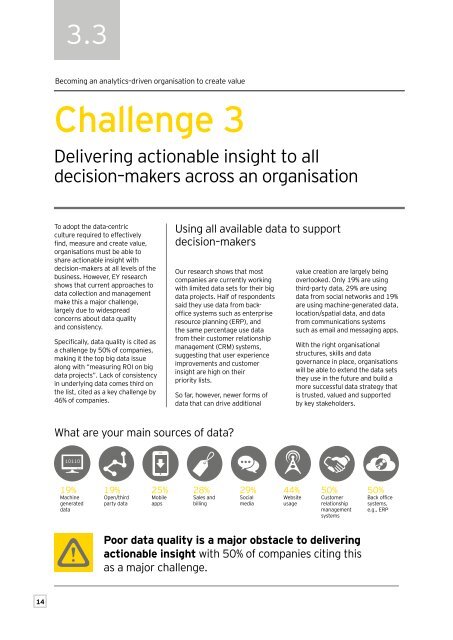ey big data report_low-res
ey big data report_low-res
ey big data report_low-res
Create successful ePaper yourself
Turn your PDF publications into a flip-book with our unique Google optimized e-Paper software.
3.3 3.4<br />
Becoming an analytics–driven organisation to create value<br />
Becoming an analytics–driven organisation to create value<br />
Challenge 3<br />
Delivering actionable insight to all<br />
decision–makers across an organisation<br />
Challenge 4<br />
Developing the talent needed to<br />
convert <strong>data</strong> into business value<br />
To adopt the <strong>data</strong>-centric<br />
culture required to effectively<br />
find, measure and create value,<br />
organisations must be able to<br />
share actionable insight with<br />
decision–makers at all levels of the<br />
business. However, EY <strong>res</strong>earch<br />
shows that current approaches to<br />
<strong>data</strong> collection and management<br />
make this a major challenge,<br />
largely due to widespread<br />
concerns about <strong>data</strong> quality<br />
and consistency.<br />
Specifically, <strong>data</strong> quality is cited as<br />
a challenge by 50% of companies,<br />
making it the top <strong>big</strong> <strong>data</strong> issue<br />
along with “measuring ROI on <strong>big</strong><br />
<strong>data</strong> projects”. Lack of consistency<br />
in underlying <strong>data</strong> comes third on<br />
the list, cited as a k<strong>ey</strong> challenge by<br />
46% of companies.<br />
Our <strong>res</strong>earch shows that most<br />
companies are currently working<br />
with limited <strong>data</strong> sets for their <strong>big</strong><br />
<strong>data</strong> projects. Half of <strong>res</strong>pondents<br />
said th<strong>ey</strong> use <strong>data</strong> from backoffice<br />
systems such as enterprise<br />
<strong>res</strong>ource planning (ERP), and<br />
the same percentage use <strong>data</strong><br />
from their customer relationship<br />
management (CRM) systems,<br />
suggesting that user experience<br />
improvements and customer<br />
insight are high on their<br />
priority lists.<br />
So far, however, newer forms of<br />
<strong>data</strong> that can drive additional<br />
What are your main sources of <strong>data</strong><br />
10110<br />
Using all available <strong>data</strong> to support<br />
decision–makers<br />
value creation are largely being<br />
overlooked. Only 19% are using<br />
third-party <strong>data</strong>, 29% are using<br />
<strong>data</strong> from social networks and 19%<br />
are using machine-generated <strong>data</strong>,<br />
location/spatial <strong>data</strong>, and <strong>data</strong><br />
from communications systems<br />
such as email and messaging apps.<br />
With the right organisational<br />
structu<strong>res</strong>, skills and <strong>data</strong><br />
governance in place, organisations<br />
will be able to extend the <strong>data</strong> sets<br />
th<strong>ey</strong> use in the future and build a<br />
more successful <strong>data</strong> strategy that<br />
is trusted, valued and supported<br />
by k<strong>ey</strong> stakeholders.<br />
Specialist skills are needed to<br />
develop a compelling business<br />
case for <strong>big</strong> <strong>data</strong> projects and<br />
to plan and execute them cost<br />
effectively. However, a lack of skills<br />
was the fifth most commonly cited<br />
main barrier to <strong>big</strong> <strong>data</strong> projects.<br />
While some companies lack the<br />
skills required to adopt valuedriven<br />
decision making, the vast<br />
majority still rely on in-house<br />
teams to identify business<br />
requirements for <strong>big</strong> <strong>data</strong> projects,<br />
develop business cases, conduct<br />
ROI modelling and deliver projects.<br />
In an attempt to bridge the skills<br />
gap, 38% of companies are looking<br />
to hire people with <strong>big</strong> <strong>data</strong> skills,<br />
while 21% are retraining their<br />
existing technical staff.<br />
As an additional concern, only<br />
26% of organisations are training<br />
business staff in <strong>big</strong> <strong>data</strong>-related<br />
disciplines. This shows that<br />
companies are still unprepared<br />
to adopt <strong>big</strong> <strong>data</strong> across their<br />
organisations, limiting the<br />
potential to create additional<br />
business value.<br />
Keeping up with technology remains<br />
a challenge<br />
Our <strong>res</strong>earch shows that the<br />
lack of <strong>big</strong> <strong>data</strong> skills in most<br />
companies creates significant<br />
technology challenges. For<br />
example, 36% of <strong>res</strong>pondents<br />
cite “identifying <strong>big</strong> <strong>data</strong><br />
technologies” as a challenge, and<br />
32% <strong>report</strong> issues with technology<br />
implementation. This is not<br />
surprising given the pace of <strong>big</strong><br />
<strong>data</strong> technology developments.<br />
To overcome these challenges<br />
and maximise the potential for<br />
value creation, organisations<br />
must acquire the skills needed to<br />
deliver every stage of a <strong>big</strong> <strong>data</strong><br />
project, from building an effective<br />
business case and modelling ROI,<br />
to selecting and implementing a<br />
successful technology strategy<br />
and appropriate, cost-effective<br />
architectu<strong>res</strong>. This can be achieved<br />
by bringing new skills on board<br />
and changing the organisational<br />
structure to embed <strong>big</strong> <strong>data</strong> into<br />
the decision-making processes.<br />
Another useful strategy is to<br />
partner with third-party companies<br />
who are <strong>big</strong> <strong>data</strong> specialists,<br />
including consultancies, boutique<br />
<strong>big</strong> <strong>data</strong> providers, systems<br />
integrators and software-as-aservice<br />
providers.<br />
While <strong>big</strong> <strong>data</strong> skills are needed to<br />
overcome technology challenges,<br />
there is some good news for<br />
smaller companies wishing to<br />
embrace value-driven decision–<br />
making. With only a 9% gap<br />
between <strong>big</strong> <strong>data</strong> activities in<br />
small and large companies, we<br />
are seeing a democratisation<br />
of advanced analytics through<br />
developments such as pay-as-yougo<br />
cloud computing and softwareas-a-service.<br />
19%<br />
Machine<br />
generated<br />
<strong>data</strong><br />
19%<br />
Open/third<br />
party <strong>data</strong><br />
25%<br />
Mobile<br />
apps<br />
28%<br />
Sales and<br />
billing<br />
29%<br />
Social<br />
media<br />
44%<br />
Website<br />
usage<br />
50%<br />
Customer<br />
relationship<br />
management<br />
systems<br />
50%<br />
Back office<br />
systems,<br />
e.g., ERP<br />
Poor <strong>data</strong> quality is a major obstacle to delivering<br />
actionable insight with 50% of companies citing this<br />
as a major challenge.<br />
While half of companies are concerned about the<br />
quality and consistency of their <strong>data</strong>, 69% continue<br />
to manage their <strong>big</strong> <strong>data</strong> projects in-house.<br />
14<br />
15


